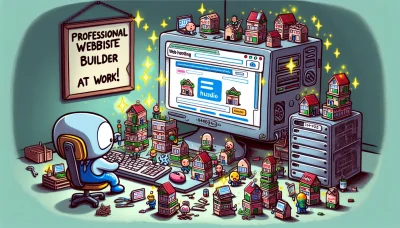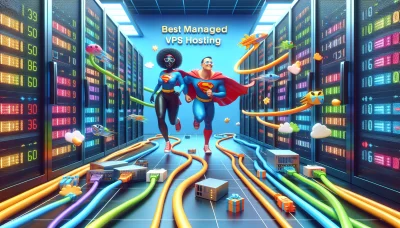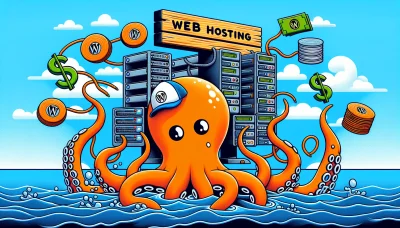Nonprofit website builder Quiz
Test Your Knowledge
Question of
The Importance of a Nonprofit Website Builder
A nonprofit website builder plays a crucial role in the digital presence of nonprofit organizations, especially in the context of web hosting. It provides a user-friendly platform that enables these organizations to create and manage their websites without the need for extensive technical knowledge. This is particularly significant for nonprofits, as they often operate with limited budgets and may not have the resources to hire professional web developers. A nonprofit website builder offers a cost-effective solution, allowing these organizations to focus their resources on their core mission. Moreover, many of these builders come with hosting solutions tailored to the needs of nonprofits, ensuring that their websites are reliable, secure, and capable of handling the specific challenges faced by these organizations online.
Features to Look for in a Nonprofit Website Builder
- User-friendly Interface: Easy for all team members to use, regardless of technical skill.
- Customizable Templates: Offers a variety of templates that can be tailored to fit the nonprofit's branding and needs.
- Donation Tools: Integrated tools that facilitate secure online donations directly from the website.
- Event Management: Features that allow for the creation, management, and promotion of events.
- Volunteer Management: Capabilities to recruit, sign up, and manage volunteers through the website.
- SEO Optimization: Built-in tools to help improve the website's visibility on search engines.
- Mobile Responsiveness: Ensures the website is easily navigable on mobile devices.
- Social Media Integration: Allows for easy sharing of content across social media platforms.
- Email Marketing: Integration with email marketing tools to communicate with supporters.
- Analytics and Reporting: Tools to track website performance and user engagement.
- Security Features: Strong security measures to protect sensitive information.
- Technical Support: Accessible and helpful support for troubleshooting and guidance.
Top Nonprofit Website Builders for Web Hosting
| Website Builder | Storage | Bandwidth | SSL Certificate | Custom Domain | Price (Starting From) |
|---|---|---|---|---|---|
| Wix | 500 MB | 1 GB | Free | Yes | Free plan available; Premium starts at $14/month |
| Squarespace | Unlimited | Unlimited | Free | Yes | $12/month |
| Weebly | 500 MB | Unlimited | Free | Yes | Free plan available; Pro plan starts at $12/month |
| WordPress.com | 3 GB | Unlimited | Free | Yes | Free plan available; Personal plan starts at $4/month |
| Shopify | Unlimited | Unlimited | Free | Yes | $29/month |
How to Choose the Right Nonprofit Website Builder for Your Organization
Choosing the right nonprofit website builder for your organization is crucial for establishing a strong online presence. Start by evaluating your needs, including the type of content you plan to publish, the level of customization you require, and any specific features like donation processing or event management. Consider the ease of use, as you'll want a platform that you and your team can easily update without extensive technical knowledge. Look for builders that offer nonprofit discounts or special features tailored to charitable organizations. Additionally, check reviews and ask for recommendations from other nonprofits. Lastly, ensure the platform you choose offers reliable customer support and scalability options to grow with your organization.
The Role of Web Hosting in Nonprofit Website Building
Web hosting plays a pivotal role in the construction and maintenance of websites for nonprofit organizations. It serves as the foundation that stores all the website's files and data, making it accessible to anyone on the internet. For nonprofits, choosing the right web hosting service is crucial as it affects the website's reliability, speed, and security. A reliable web host ensures that the website is always available to potential donors, volunteers, and those in need of services, while fast loading times improve user experience and engagement. Furthermore, enhanced security features protect sensitive information from cyber threats. Thus, web hosting is not merely a technical necessity but a strategic asset in amplifying a nonprofit's mission and outreach.
The Benefits of Using a Nonprofit Website Builder for Web Hosting
- Cost-Effective Solutions: Nonprofit website builders often offer discounts or free services to charitable organizations, making it a budget-friendly option.
- Customizable Templates: They provide a variety of templates that are specifically designed for nonprofit needs, making it easy to create a professional-looking website.
- Donation Integration: Easy integration of donation tools and features to facilitate online giving and fundraising efforts.
- Support and Training: Access to dedicated support and training materials tailored for nonprofits to help them manage and update their websites efficiently.
- Community and Networking: Opportunities to connect with other nonprofit organizations, sharing resources, and best practices.
- Security Features: Enhanced security features to protect sensitive information, such as donor data and transactions.
- SEO Tools: Built-in SEO tools to help improve the visibility of the website in search engine results, attracting more visitors and potential donors.
Case Study: Successful Nonprofit Websites Built with Nonprofit Website Builders
In recent years, numerous nonprofit organizations have leveraged the power of nonprofit website builders to create engaging, functional, and impactful online presences. These website builders, designed with the specific needs of nonprofits in mind, have enabled organizations to launch websites that not only tell their story but also facilitate donations, volunteer sign-ups, and community engagement. Among these success stories, the website for "Global Health Initiative" stands out for its user-friendly design and effective donation system, which has seen a significant increase in contributions. Another notable example is "Eco Warriors," a nonprofit focused on environmental advocacy, which used a website builder to create an interactive platform that educates visitors on sustainability practices and how to get involved in local initiatives. These examples underscore the effectiveness of nonprofit website builders in helping organizations achieve their mission by reaching a wider audience and enhancing their online presence.
Common Mistakes to Avoid When Using a Nonprofit Website Builder
- Choosing a platform without adequate research into its features and limitations.
- Ignoring the importance of a mobile-responsive design.
- Overlooking the need for easy navigation and user-friendly interfaces.
- Not customizing templates to fit the nonprofit's brand and mission.
- Failing to integrate necessary functionalities like donation buttons or event calendars.
- Underestimating the importance of website security and data protection.
- Forgetting to optimize for search engines to increase visibility.
- Skipping the creation of compelling content that engages and informs visitors.
- Neglecting regular website updates and maintenance.
- Overlooking the analytics and feedback to understand visitor behavior and improve the website.
Conclusion: The Future of Nonprofit Website Builders and Web Hosting
As we look towards the future, it's clear that nonprofit website builders and web hosting services are on a path of transformative evolution. The convergence of these technologies promises to offer unparalleled ease of use, efficiency, and cost-effectiveness, making it easier than ever for nonprofits to establish and maintain a strong online presence. Innovations in AI, cloud computing, and user-friendly design interfaces are set to further democratize web development, enabling even those with minimal technical expertise to create impactful, professional-quality websites. Moreover, the focus on sustainability and security ensures that nonprofit organizations can trust these platforms to support their missions reliably and responsibly. As we move forward, the integration of these services will continue to break down barriers, fostering a more connected, empowered, and effective nonprofit sector worldwide.












